Spanish volcano still packs a punch 5 days after eruption
TODOQUE, Canary Islands (AP) — A volcano in Spain’s Canary Islands kept nerves on edge Friday for a fifth day since it erupted, producing loud explosions, a huge ash cloud and cracking open a new fissure that spewed out more fiery molten rock.
The archipelago’s emergency services ordered the evacuation of scores of people from three villages on the island of La Palma and ordered residents to stay indoors in another. Already this week, almost 7,000 people have had to leave their homes. The prompt evacuations are credited with helping avoid casualties.
Loud bangs from the volcano’s mouth sent shock waves echoing across the hillsides. Explosions hurled molten rock and ash over a wide expanse. As a precaution, emergency services pulled back from the area.
Regional airline Binter temporarily halted flights due to a huge ash cloud that rose 6 kilometers (almost 4 miles) into the sky.
More encouragingly, Spain’s National Geographic Institute said it hadn’t recorded any earthquakes in the area for 24 hours, after registering 1,130 over the past week amid intense seismic activity before and after the eruption on the Cumbre Vieja volcanic ridge.
Seismic activity at Spanish volcano intensifies
Also, the advance of the main river of lava slithering toward the sea slowed to 1 meter (about 3 feet) per hour.
Both of the main lava flows are at least 10 meters (33 feet) high at their leading edges and have been destroying houses, farmland and infrastructure in their path since Sunday.
The lava has destroyed almost 400 buildings on La Palma, including many homes, on the western side of the island of 85,000 people, a European Union monitoring program said.
It said the lava stretches over 180 hectares (almost 20,000 square feet) and has blocked 14 kilometers (9 miles) of roads. Islanders make a living mostly from farming and tourism, and some may lose their livelihoods.
On a visit to La Palma, Spanish Prime Minister Pedro Sánchez announced a package of measures to help get the island back on its feet and “rebuild lives.”
The Spanish government will provide aid for rebuilding homes and public infrastructure, such as roads, irrigation networks and schools, as well as relaunching the island’s tourism industry, Sánchez said. He did not say how much money would be made available, but said a Cabinet meeting next week would provide more details.
Scientists say the lava flows could last for weeks or months.
The Associated Press
Firefighters retreat as volcanic explosions intensify in Canary Islands
Issued on: 24/09/2021 -
 Residents look from a hill as lava continues to flow from an erupted volcano, on the island of La Palma in the Canaries, Spain, on September 24, 2021. © Emilio Morenatti, AP
Residents look from a hill as lava continues to flow from an erupted volcano, on the island of La Palma in the Canaries, Spain, on September 24, 2021. © Emilio Morenatti, AP
Text by : NEWS WIRES
Intensifying volcanic explosions on the Spanish island of La Palma forced firefighters to retreat and authorities to evacuate three more towns on Friday, while airlines cancelled flights due to a cloud of gas and ash, the biggest since the volcano erupted.
Firefighters pulled out of clean-up work in the town of Todoque on Friday afternoon as a new vent opened up in the flank of the volcano and videos shared on social media showed a massive shockwave emanating from the eruption site.
A Reuters witness saw a huge grey cloud billowing from the top of the volcano on Friday afternoon, the largest since the eruption began on Sunday.
“The volcano is in a newly explosive phase ... Firefighters will not operate anymore today,” tweeted the Tenerife fire service, which has been deployed to help on La Palma.
Authorities ordered the evacuation of the towns of Tajuya, Tacande de Abajo and the part of Tacande de Arriba that had not already been evacuated on Friday afternoon, with residents told to assemble at the local football ground.
It wasn’t just people being evacuated, but animals too.
“The evacuation of people is the main priority ... although there are also other important tasks such as keeping pets safe,” the Guardia Civil tweeted, with a video showing officers carrying reluctant goats to safety.
Since erupting on Sunday, the Cumbre Vieja volcano has spewed out thousands of tons of lava, destroyed hundreds of houses and forced the evacuation of thousands of people.
No serious injuries or fatalities have been reported but about 15% of the island’s economically crucial banana crop could be at risk, jeopardising thousands of jobs.
Canary Island airline Binter said on Friday it had cancelled all flights to La Palma due to the volcano eruption, while Iberia cancelled its only flight scheduled for the day, and another local airline, Canaryfly, also suspended operations.
Binter said it was forced to halt operations to and from La Palma as the ash cloud had worsened considerably in the last few hours.
The airline, which had initially only cancelled night flights, could not say when it would resume operations.
A cloud of toxic gas and ash extends more than 4 km (2.5 miles) into the sky, the Canaries volcanology institute said on Thursday.
It has begun to drift northeast towards the Mediterranean and Spanish mainland, the national weather agency said.
Airspace above the island remains open apart from two small areas near the eruption site.
(REUTERS)
TODOQUE, Canary Islands (AP) — A volcano in Spain’s Canary Islands kept nerves on edge Friday for a fifth day since it erupted, producing loud explosions, a huge ash cloud and cracking open a new fissure that spewed out more fiery molten rock.
The archipelago’s emergency services ordered the evacuation of scores of people from three villages on the island of La Palma and ordered residents to stay indoors in another. Already this week, almost 7,000 people have had to leave their homes. The prompt evacuations are credited with helping avoid casualties.
Loud bangs from the volcano’s mouth sent shock waves echoing across the hillsides. Explosions hurled molten rock and ash over a wide expanse. As a precaution, emergency services pulled back from the area.
Regional airline Binter temporarily halted flights due to a huge ash cloud that rose 6 kilometers (almost 4 miles) into the sky.
More encouragingly, Spain’s National Geographic Institute said it hadn’t recorded any earthquakes in the area for 24 hours, after registering 1,130 over the past week amid intense seismic activity before and after the eruption on the Cumbre Vieja volcanic ridge.
Seismic activity at Spanish volcano intensifies
Also, the advance of the main river of lava slithering toward the sea slowed to 1 meter (about 3 feet) per hour.
Both of the main lava flows are at least 10 meters (33 feet) high at their leading edges and have been destroying houses, farmland and infrastructure in their path since Sunday.
The lava has destroyed almost 400 buildings on La Palma, including many homes, on the western side of the island of 85,000 people, a European Union monitoring program said.
It said the lava stretches over 180 hectares (almost 20,000 square feet) and has blocked 14 kilometers (9 miles) of roads. Islanders make a living mostly from farming and tourism, and some may lose their livelihoods.
On a visit to La Palma, Spanish Prime Minister Pedro Sánchez announced a package of measures to help get the island back on its feet and “rebuild lives.”
The Spanish government will provide aid for rebuilding homes and public infrastructure, such as roads, irrigation networks and schools, as well as relaunching the island’s tourism industry, Sánchez said. He did not say how much money would be made available, but said a Cabinet meeting next week would provide more details.
Scientists say the lava flows could last for weeks or months.
The Associated Press
Text by : NEWS WIRES
Intensifying volcanic explosions on the Spanish island of La Palma forced firefighters to retreat and authorities to evacuate three more towns on Friday, while airlines cancelled flights due to a cloud of gas and ash, the biggest since the volcano erupted.
Firefighters pulled out of clean-up work in the town of Todoque on Friday afternoon as a new vent opened up in the flank of the volcano and videos shared on social media showed a massive shockwave emanating from the eruption site.
A Reuters witness saw a huge grey cloud billowing from the top of the volcano on Friday afternoon, the largest since the eruption began on Sunday.
“The volcano is in a newly explosive phase ... Firefighters will not operate anymore today,” tweeted the Tenerife fire service, which has been deployed to help on La Palma.
Authorities ordered the evacuation of the towns of Tajuya, Tacande de Abajo and the part of Tacande de Arriba that had not already been evacuated on Friday afternoon, with residents told to assemble at the local football ground.
It wasn’t just people being evacuated, but animals too.
“The evacuation of people is the main priority ... although there are also other important tasks such as keeping pets safe,” the Guardia Civil tweeted, with a video showing officers carrying reluctant goats to safety.
Since erupting on Sunday, the Cumbre Vieja volcano has spewed out thousands of tons of lava, destroyed hundreds of houses and forced the evacuation of thousands of people.
No serious injuries or fatalities have been reported but about 15% of the island’s economically crucial banana crop could be at risk, jeopardising thousands of jobs.
Binter said it was forced to halt operations to and from La Palma as the ash cloud had worsened considerably in the last few hours.
The airline, which had initially only cancelled night flights, could not say when it would resume operations.
A cloud of toxic gas and ash extends more than 4 km (2.5 miles) into the sky, the Canaries volcanology institute said on Thursday.
It has begun to drift northeast towards the Mediterranean and Spanish mainland, the national weather agency said.
Airspace above the island remains open apart from two small areas near the eruption site.
(REUTERS)
VIDEO: Huge Shockwave Explodes From La Palma Volcano
 © REUTERS / POOL
© REUTERS / POOL
The Cumbre Vieja volcano erupted on Sunday, sending flows of lava down its flanks and gullies and forcing the evacuation of thousands of residents of the small Atlantic island of La Palma, which has not seen an eruption since 1971.Three more villages have been evacuated in the Canarian island of La Palma as violent explosions burst from its erupting volcano.Regional newspaper Diario de Avisos (the Daily Advertiser) tweeted an astonishing video of a "brutal" explosion from the peak, with the shockwave clearly visible as it passes through the plume of smoke and ash.Witnesses among a crowd of emergency service workers are heard exclaiming at the sight and sound of the distant eruption on the Cumbre Vieja (Old Peak) volcano.The newspaper reported that the blasts prompted the evacuation of Tacande de Abajo, Tacande de Arriba, and Tajuya in the El Paso municipality to the northwest of the volcan A new vent on the slope of the erupting peak was spotted spewing a small plume of ash.La Palma is one of the smallest and westernmost of the seven-island Canary archipelago, a Spanish territory in the Atlantic ocean off the coast of Morocco and Western Sahara.

La Palma Island Volcanic Eruption Sends Lava Flowing to Residential Buildings
The eruption engulfed 410 acres of land and destroyed about 350 homes
:focal(2610x1923:2611x1924)/https://tf-cmsv2-smithsonianmag-media.s3.amazonaws.com/filer_public/07/3d/073d1446-336e-4abd-995c-195f1c62f6c5/gettyimages-1235366980.jpg)
On September 19, the Cumbre Vieja volcano on Spain's La Palma Island exploded into a fury of red plumes and smoke that spewed lava 14,000 feet into the air, Renata Brito and Barry Hatton report or the Associated Press.
The volcano's eruption is the first in 50 years in the Canary archipelago located off the northwestern coast of Africa, Raphael Minder reports for the New York Times. The stream-like lava flow engulfed nearby forests and homes, forcing 5,000 locals and 500 tourists to evacuate, Scott Neuman reports for NPR. The eruption followed a week of seismic activity where more than 22,000 tremors were reported, per Borja Suarez for Reuters.
"When the volcano erupted today, I was scared. For journalists, it is something spectacular, for us, it is a tragedy. I think the lava has reached some relatives' houses," Isabel Fuentes, a resident told Spanish television TVE, Reuters reports. "I was five years old when the volcano last erupted (in 1971). You never get over a volcanic eruption."
La Palma is the smallest of the Canary Islands in the Atlantic Ocean. Just before the eruption, a 3.8 magnitude earthquake shook the island, reports the New York Times. Since the volcano's eruption, streams of lava from five fissures on the side of the volcano continued to spill out. On the first day following the eruption, lava was moving at a whopping 2,300 feet per hour, reports the Associated Press. One 2,000-foot-wide lava stream finally slowed to 13 feet per hour after reaching a plain on Wednesday, per AP.
/https://tf-cmsv2-smithsonianmag-media.s3.amazonaws.com/filer_public/68/a8/68a8e266-44ed-4285-91ff-c71a73748013/gettyimages-1341432376.jpg)
Europa Press News/Getty Images
By Thursday, September 23, the lava flow's advancement slowed, along with the seismic activity, but molten rock was still spewing from the volcano, per the Associated Press. Nearly 26 million cubic meters of molten rock have been emitted so far. Some experts suspect that the lava's heat at a scorching 1,800 degrees could trigger landslides or explosions and release toxic gases when it reaches the ocean and collides with the water, reports Tereza Pultarova for Space.com.
"The lava is advancing very slowly because it cools in contact with the atmosphere, through friction with the ground and building materials and, above all, because its front edge is widening out," explains Starvos Meletlidis, a volcanologist with Spain's National Geographic Institute, to the Associated Press.
In some places, as the lava flow slowed and grew thicker, it rose to 50 feet high. In total, the lava has covered 410 acres and destroyed roughly 350 homes. Scientists suspect the flows could last a few weeks or months. Also known as the Old Summit, Cumbre Vieja's last eruption persisted for three weeks, reports Nicoletta Lanese for Live Science.
Multiple videos of the lava flowing into the nearby village of El Paso have been shared on social media platforms. In some videos, homes were seen engulfed by lava, including one that shows molten rock spilling into a swimming pool. About 400 firefighters and emergency workers have been sent from other islands in the Canary archipelago to assist with any fires caused by the lava flows, reports Al Goodman and Vasco Cotovio for CNN.
Firefighters retreat as La Palma volcanic explosions intensify
Firefighters pulled out of clean-up work in the town of Todoque on Friday afternoon as a new vent opened up in the flank of the volcano and videos shared on social media showed a massive shockwave emanating from the eruption site.
A Reuters witness saw a huge grey cloud billowing from the top of the volcano on Friday afternoon, the largest since the eruption began on Sunday.
“The volcano is in a newly explosive phase … Firefighters will not operate anymore today,” tweeted the Tenerife fire service, which has been deployed to help on La Palma.
Authorities ordered the evacuation of the towns of Tajuya, Tacande de Abajo and the part of Tacande de Arriba that had not already been evacuated on Friday afternoon, with residents told to assemble at the local football ground.
Canary Islands emergency services had initially told residents to stay indoors to avoid the dense cloud of ash and lava fragments but later decided to evacuate due to the heightened risk from explosions.
It wasn’t just people being evacuated, but animals too.
“The evacuation of people is the main priority … although there are also other important tasks such as keeping pets safe,” the Guardia Civil tweeted, with a video showing officers carrying reluctant goats to safety.
Since erupting on Sunday, the Cumbre Vieja volcano has spewed out thousands of tons of lava, destroyed hundreds of houses and forced the evacuation of thousands of people.
No serious injuries or fatalities have been reported but about 15% of the island’s economically crucial banana crop could be at risk, jeopardising thousands of jobs.
Canary Island airline Binter said on Friday it had cancelled all flights to La Palma due to the volcano eruption https://www.reuters.com/world/europe/canaries-volcano-blasts-lava-into-air-ash-blankets-area-2021-09-23, while Iberia cancelled its only flight scheduled for the day, and another local airline, Canaryfly, also suspended operations.
Binter said it was forced to halt operations to and from La Palma as the ash cloud had worsened considerably in the last few hours.
The airline, which had initially only cancelled night flights, could not say when it would resume operations.
A cloud of toxic gas and ash extends more than 4 km (2-1/2 miles) into the sky, the Canaries volcanology institute said on Thursday.
It has begun to drift northeast towards the Mediterranean and Spanish mainland, the national weather agency said.
Airspace above the island remains open apart from two small areas near the eruption site.
(Reporting by Guillermo Martinez and Marco Trujillo in La Palma and Emma Pinedo and Jessica Jones in MadridEditing by Nathan Allen, Raissa Kasolowsky and Giles Elgood)



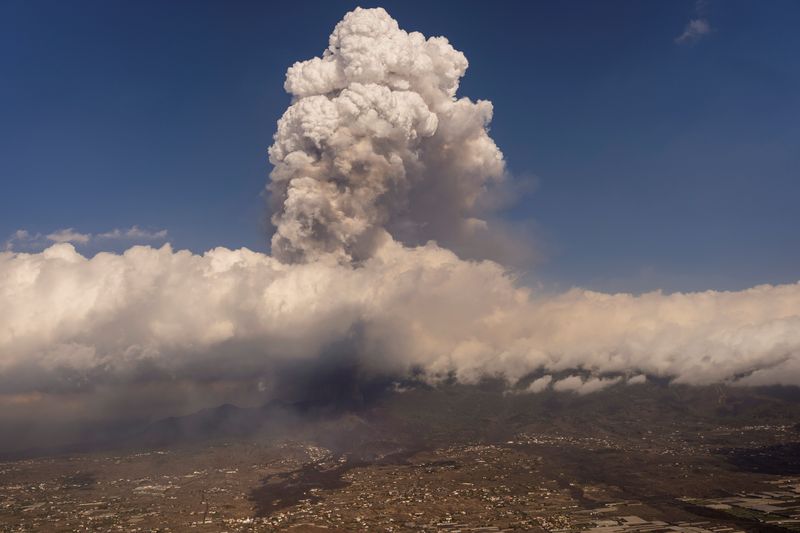
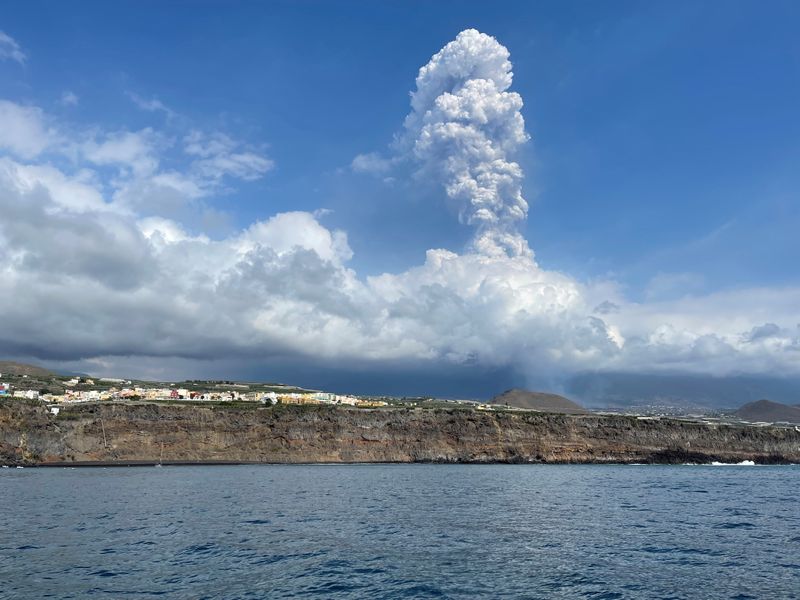
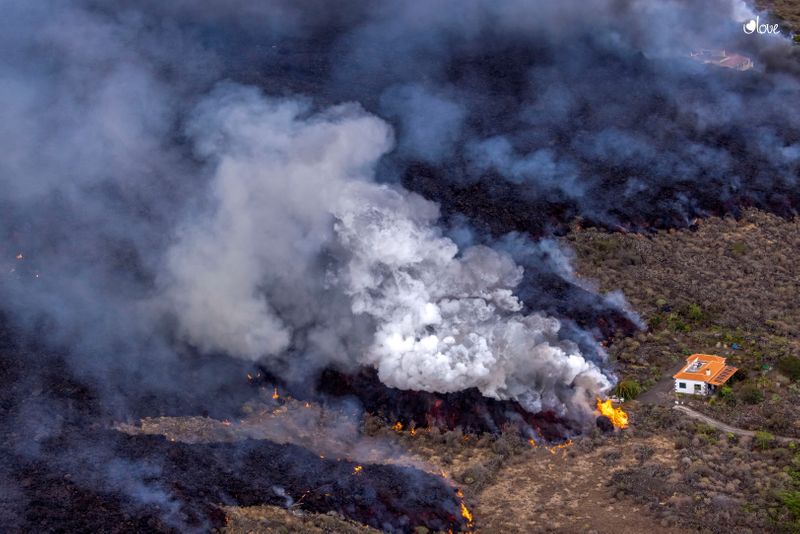
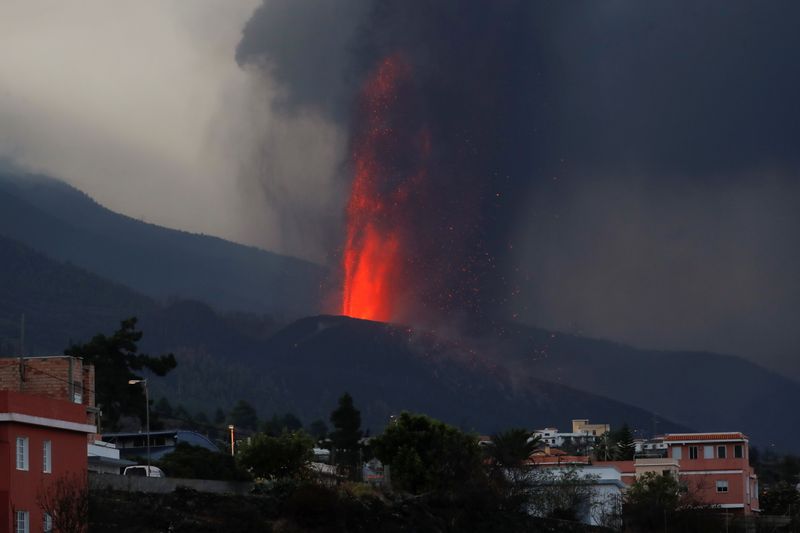
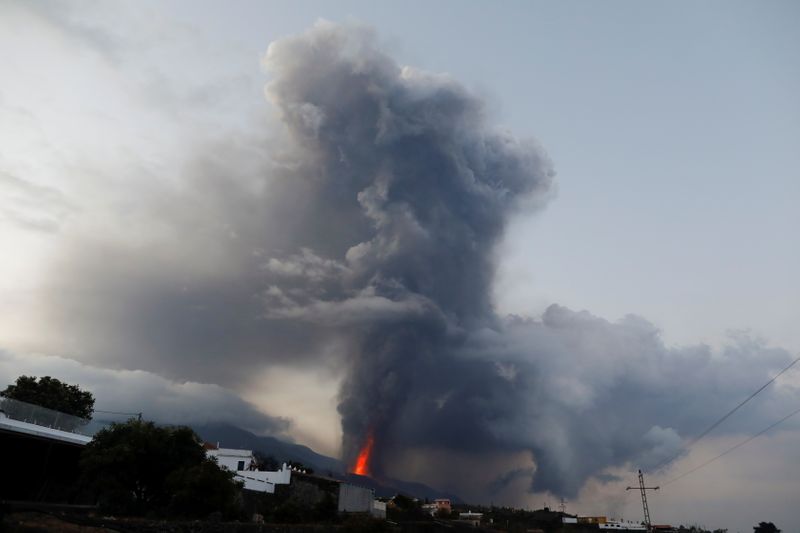
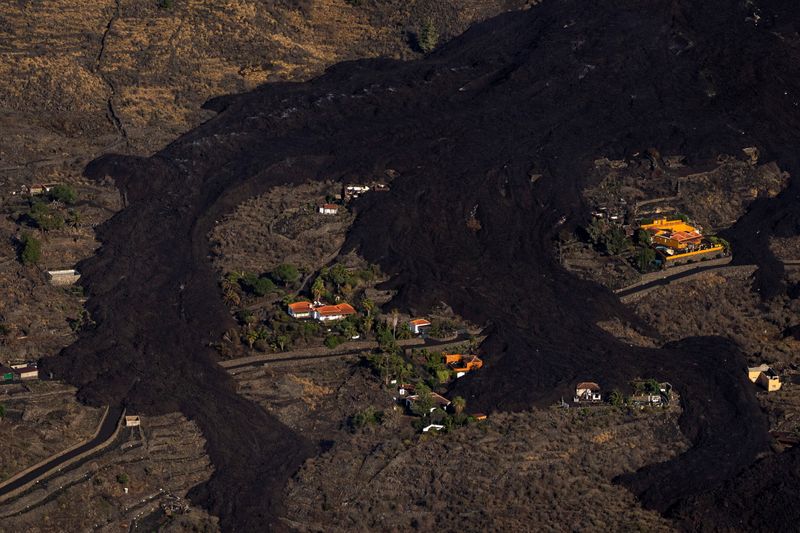
No comments:
Post a Comment